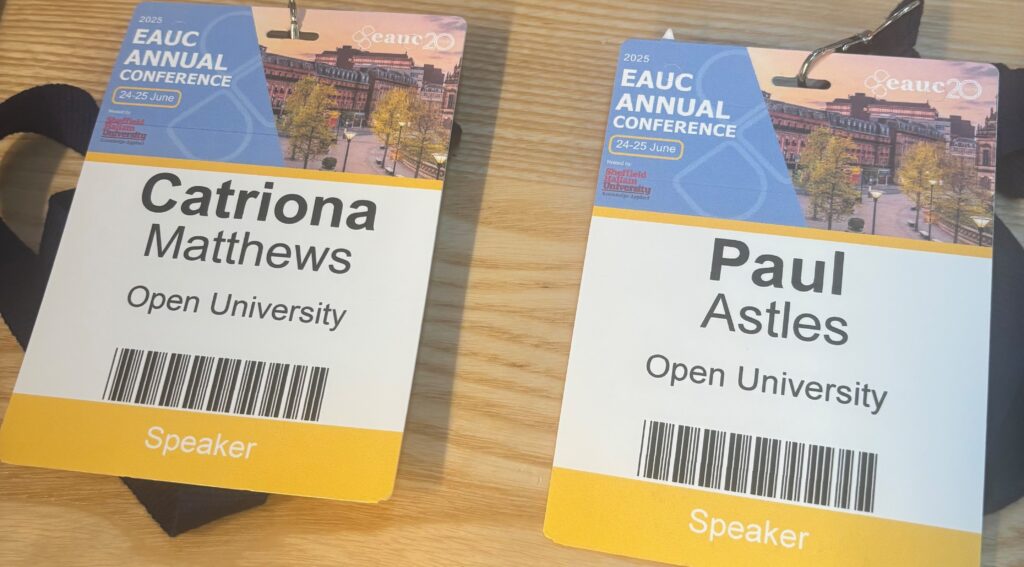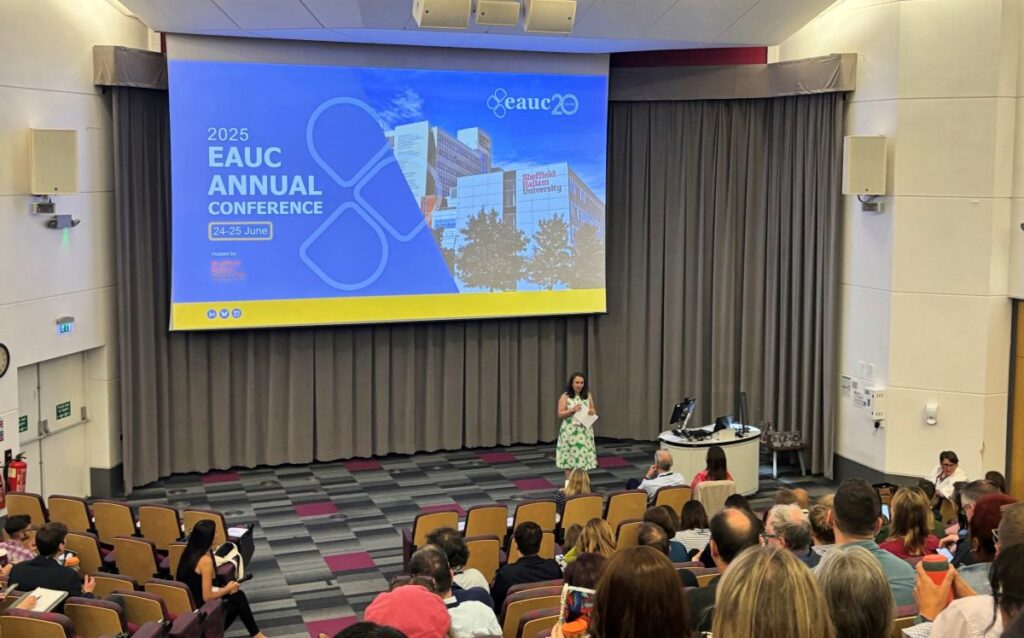Paul Astles and Catriona Matthews ~ Learning Designers
We felt proud (and lucky, given the uncertain financial situation across Higher Education) to be invited to speak at the 2025 Environmental Association of Universities and Colleges (aka EAUC) conference and to represent both the Open University and the Learning Design team for the second year in a row. We both had early starts to catch our respective trains up to Sheffield Hallam University where we made the most of the opportunity to disseminate our work and to network with enthusiastic and interested colleagues on the conference’s first day.
The unofficial theme of the conference was ‘Wellbeing’. This was embodied in the friendly welcome we received and the abundance of amazing (and sustainably conscious) food that was served throughout the day. A key message from one of the opening keynotes was to ‘focus on the things you can do rather than worry about the things you can’t’. This positive, action-focused approach was continued throughout the day with sessions that ranged from more formal keynotes through to nature walks.

Sharing our project
We shared our project ‘Words of Wisdom’ as part of a sector showcase session. There were two other Universities representing their projects in this showcase. We all gave an elevator style pitch, and the audience then chose what they wanted to find out more about. It was great fun preparing our pitch and we had a rich discussion with participants about the work we are doing and learnt so much from them as well!
Before we share our takeaways from our session, let’s do another quick elevator pitch and tell you a bit more about ‘Words of Wisdom’. The purpose of the ‘Words of Wisdom’ project is to provide inspiration to colleagues by collecting and sharing bitesize examples of how sustainability has been embedded within the curricula and/or student learning experience. It’s important to us that these examples are replicable and actionable so others can adapt them and bring them into their own practice. Equally important for the project is to connect with and represent what resonates most with students. This means representing their views and input into what they want to see sustainability wise within their learning journey at the Open University.
The motivation for this project came from our work in Learning Design. We found that colleagues often found it easier to bring sustainability into their practice when they could see examples of it being modelled in similar subjects or situations. However, it is always a challenge to find examples that are replicable in a distance learning context.
The Goldilocks challenge
In our session we discussed the Goldilocks style challenge of presenting practice examples in a way that was ‘just right’ – finding the right balance of being detailed and engaging whilst also being maintainable. A key takeaway from this discussion was the value ensuring examples don’t get siloed in their specific subject or context and demonstrating where possible the wider value and links it can have.
Participants also shared some examples of practice which inspired them. It was agreed that having access to examples from other institutions is motivational, we discussed how much time and effort goes into capturing these examples and confirmed they really do have an impact!

What other sessions taught us
We also had time to attend multiple interesting sessions where we learnt about exciting work going on across the sector. For example, the Department for Education have created a website to help educational institutions have a climate action plan by the end of 2025. We want to shine a spotlight on a session called “Embedding Education for Sustainable Development (ESD) in different subject areas” which really resonated with us. In this session we heard case studies which showed how ESD has been embedded across diverse subject areas, including Modern Languages, Psychology, and Construction.
We learnt about the importance of contextualising sustainability knowledge (something we often talk about), how some colleagues are bringing nature into their teaching through interdisciplinary sessions, and how sometimes the biggest impact can be made by small ripple effects.
We were guided in groups to try out an approach being used by Chesterfield College to help subjects, who may not traditionally or easily find connection with sustainability, see opportunities. This involved doing a SWOT analysis where we worked in groups to identify opportunities and challenges in embedding ESD which were then brought forward into a reflective action plan.
We left the conference with our heads and hearts (and bellies!) full. We walked back to the train station with a renewed and enduring sense of optimism, pride, and determination to drive our ‘Words of Wisdom’ project forward. We heard many wise words that day in Sheffield and we look forward to continuing to reflect and share them with you.
Call to action:
We’d love to hear the ways you share and inspire others with good practice relating to embedding sustainability into your curricula or student learning experiences. Please leave a comment on our social media channels (Bluesky or LinkedIn) or email us at [email protected] to tell us about it!
P.S.
A moment of celebration and sharing some additional words of wisdom. If you haven’t already seen, we’ve been published. Our chapter ‘Communicating Sustainability Competencies: A Case Study of Sustainability and Learning Design’ Details our collaboration with the Curriculum Design Student Panel in the development of our Sustainability Skills Cards. You can find the cards on our resource page by following the link.
Reference:
Astles, P and Matthews, C. (2025). Communicating Sustainability Competencies: A Case Study of Sustainability and Learning Design. In: Leal Filho, W., Trevisan, L.V., Pace, P.J., Mifsud, M. (eds) Education for Sustainable Development: The Contribution of Universities. World Sustainability Series. Springer, Cham. https://doi.org/10.1007/978-3-031-86985-3_6
Also, on ORO – https://oro.open.ac.uk/105104/
Banner image via Canva/SAKhanPhotography

